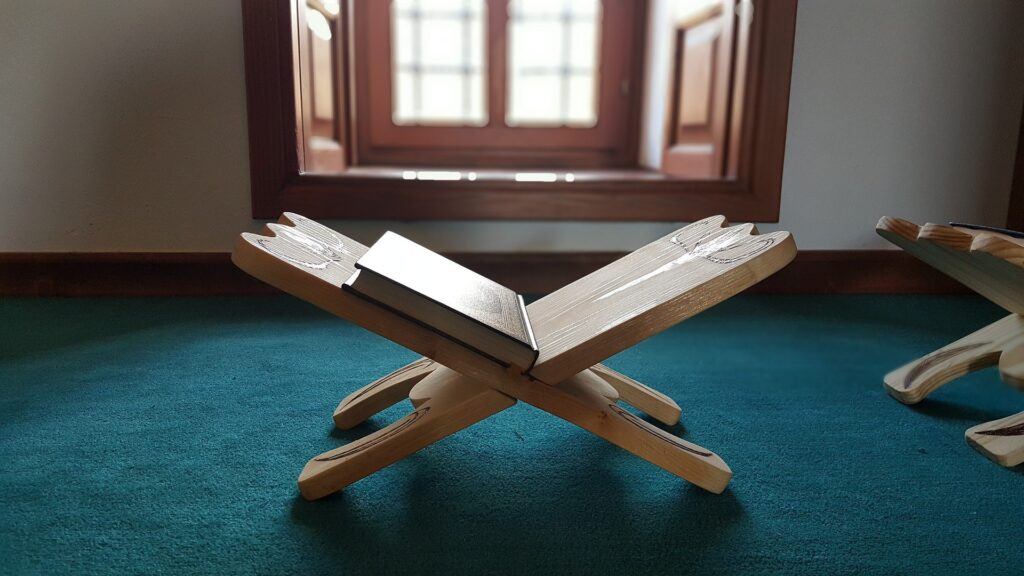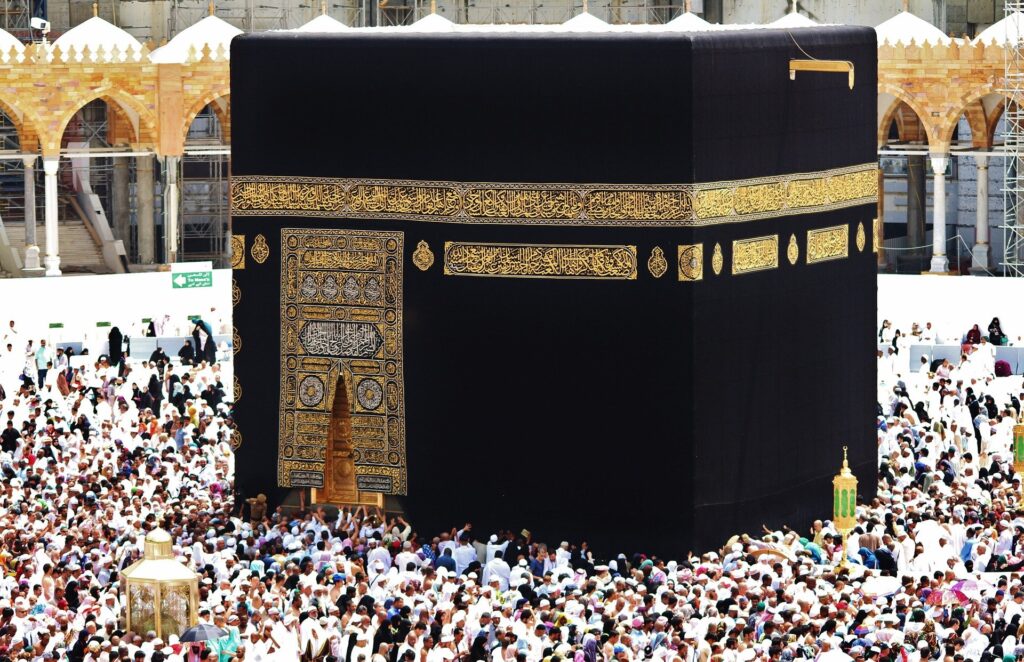Guidance regarding basic Islamic issues – which Hazrat Amirul Momineen, Khalifatul Masih Vaa has given on various occasions in his written correspondence and during MTA programmes – is being officially published below for everyone’s benefit.
Zaheer Ahmad Khan, Head of Records Department, Private Secretariat, London

The special moment for the acceptance of prayers on Fridays – The length of fara‘iz & nawafil (the obligatory & the supererogatory prayers)
Hazrat Amirul Momineen, Khalifatul Masih Vaa was asked about a statement he made during one of his Friday Sermons regarding the special time for the acceptance of prayers that comes on Fridays.
Huzooraa was also asked about another statement he made during the concluding address of Jalsa Salana UK with regard to reciting the shorter surahs of the Holy Quran during the Tarawih prayer instead of a whole part.
In a letter dated 4 February 2020, Huzooraa gave the following reply:
“In my Friday Sermon, I stated in light of the ahadith and the instructions of Hazrat Musleh-e-Maudra about the special hour of acceptance of prayers on Fridays, that it is a very short period of time. Moreover, different times of the day have been ascribed to it. Hadith scholars and jurists have also stated different times between zenith and sunset, during which this moment can occur.
“In my view, the wisdom behind ascribing different times to this hour is that the entire day of Friday is full of blessings. Hence, one should spend this whole day supplicating.

“As far as the shortening of prayers is concerned, you have confused two of my statements in this regard. I said, with reference to a hadith, that someone complained to the Holy Prophetsa about an imam who used to greatly prolong the prayers. The Holy Prophetsa expressed his displeasure over this.
“Then, I said that shortening the prayers does not mean that prayers should be offered mindlessly in a hurry. In this regard, I gave the example of [a clip of] Tarawih prayers circulating on social media in which the imam concluded all the rak‘aat of the Tarawih prayer within minutes.
“So, my point was that prayers should neither be prolonged to such an extent that the worshippers get tired and start to resent them, nor is it permissible to shorten a prayer so much that it merely looks like sudden movements instead of a prayer.
“Moreover, it should also be remembered that the prayers which the Holy Prophetsa has instructed to be kept brief, are the obligatory [farz] prayers. The reason for this is that the obligatory prayers must be performed in congregation by all. The Holy Prophetsa said that since the worshippers could include the sick, old, weak and those who needed to go to work, it was the responsibility of the imam to take all of them into consideration and conclude the prayer within a reasonable time.
“However, Tarawih is a supererogatory prayer and it is not obligatory upon everyone to perform it; rather, those who can easily participate in it should do so and those who have an excuse, are free not to. There is nothing wrong with that.
“Moreover, Tarawih prayers began during the Khilafat of Hazrat Umarra and he initiated them especially for the recitation of the Holy Quran. Therefore, there should be relatively longer recitation in them and if possible, the entire Holy Quran should be completed during the Tarawih prayers in the blessed month of Ramadan.”
The period of mourning over the dead
A lady informed Hazrat Amirul Momineen, Khalifatul Masih Vaa of the demise of her brother and asked about Islamic injunctions regarding the mourning by a widow and the mourning by other people, especially the mourning of a sister over the death of a brother.

Huzooraa, in a letter dated 4 February 2020, gave the following reply:
“Islam has guided its followers regarding every matter of happiness as well as sorrow. Hence, where, on the one hand, it exhorts to be patient after the death of a loved one, on the other, it also allows the bereaved to express grief caused by separation. All the loved ones, including parents, siblings and children of the deceased, are allowed to mourn for a maximum of three days.
“A wife, on the other hand, has been instructed to mourn the death of her husband for a period of four months and 10 days. This is mentioned in Surah al-Baqarah of the Holy Quran.
“Moreover, the instructions of the Holy Prophetsa in this regard that he gave at various occasions are also recorded in ahadith. Hence, it is narrated by Hazrat Zainabra bint Abi Salamah (who was the stepdaughter of the Holy Prophetsa):
“‘I went to Hazrat Umm Habibara, the noble wife of the Holy Prophetsa, who said that she heard Allah’s Messengersa saying, “It is not permissible for a woman who believes in Allah and the Last Day to mourn for any dead person for more than three days except for her husband, for whom she should mourn for four months and ten days.”’
“[The narrator further states:] ‘Later, I went to Hazrat Zainabra bint Jahsh when her brother died.’ When three days had passed after the demise of her brother, she asked for some scent, and after applying it on herself, she said, ‘I am not in need of scent but I heard Allah’s Messengersa, while on the pulpit, saying, “It is not permissible for a woman who believes in Allah and the Last Day to mourn for more than three days for any dead person except her husband, for whom she should mourn for four months and ten days.”’ (Sahih al-Bukhari, Kitab al-Jana‘iz, Bab ihdadul mar‘ati ala ghairi zaujihaa)
“Thus, all the bereaved, save the widow, whether they are parents, children or siblings, are allowed to mourn for only three days, not more than that.
“As far as the limits and the scope of mourning by a widow is concerned, (which is four months and ten days,) Islam does not make any exceptions to this, nor does it grant any age-related exemption. Therefore, it is incumbent upon a widow to spend this period of iddah in her home as much as possible. She is not allowed to adorn herself, participate in social events or leave the house unnecessarily during that period.
“During the iddah period, a widow may go to her husband’s grave to pray, provided that the grave is in the town where the widow resides. Moreover, if she has to go to the doctor, she would be exempt on the grounds of compelling circumstances.
“Similarly, if a widow’s family’s livelihood depends on her job or she has no other arrangements for taking the children to school and bringing them back or doing the shopping, then all these circumstances would grant her an exemption on grounds of compelling circumstances. In such a case, it would be incumbent upon her to go straight to work and return home after completing the work. That is the maximum extent of the permission to leave the house on grounds of compelling circumstances or dire need. She is not allowed to participate in any kind of social gatherings or programmes.”
Unaccompanied women performing Hajj
Hazrat Amirul Momineen, Khalifatul Masih Vaa, in a letter dated 4 February 2020, stated the following regarding an edict issued by the nazim of dar-ul-ifta on the issue of unaccompanied women going on a journey to perform Hajj. Huzooraa said:
“In my view, the condition of having a male mahram with a woman for Hajj and Umrah was based on a temporary ruling, just as other travel was forbidden for an unaccompanied woman at that time, because in those days, journeys used to be very difficult and lengthy – facilities were not available on the way and on top of that, the risks of being robbed were very high.

“Hence, when a complaint of a robbery was once brought before the Holy Prophetsa, he gave the glad tiding of peaceful journeys in the future and said to Hazrat Adira bin Hatim:
فَإِنْ طَالَتْ بِكَ حَيَاةٌ لَتَرَيَنَّ الظَّعِينَةَ تَرْتَحِلُ مِنْ الْحِيرَةِ حَتَّى تَطُوفَ بِالْكَعْبَةِ لَا تَخَافُ أَحَدًا إِلَّا اللّٰهَ
“‘If you live for a long time, you will certainly see that a lady in a howdah travelling from Al-Heera will [safely reach Mecca and] perform the tawaf [circumambulation] of the Ka‘bah, fearing none but Allah.’ [Sahih al-Bukhari, Kitab al-Manaqib]
“At the end of the same hadith, Hazrat Adira bin Hatim narrates:
فَرَأَيْتُ الظَّعِينَةَ تَرْتَحِلُ مِنْ الْحِيرَةِ حَتَّى تَطُوفَ بِالْكَعْبَةِ لَا تَخَافُ إِلَّا اللّٰهَ
“‘[Later on] I saw a lady in a howdah travelling from Al-Heera till she [arrived safely in Mecca and] performed the tawaf of the Ka‘bah, fearing none but Allah.’ (Sahih al-Bukhari, Kitab al-Manaqib)
“Al-Heera was a town in the Persian empire at that time and was located near Kufa, which means that it would have been a journey lasting several days at that time. So, in those days, if a woman could embark on a journey from Al-Heera and travel for several days and come to perform the tawaf of the Ka‘bah in Mecca, then why can’t a woman travel for a few hours by plane these days and go for Umrah and Hajj etc.?”
The believer and the world – Expiation for a missed Salat
Someone wrote to Hazrat Amirul Momineen, Khalifatul Masih Vaa and said, “I have read that only good things come to a believer but also that this world is a Hell for a believer.” He asked, “Which of these two statements is true?” The person also asked, “Is it true that if someone misses a single prayer, their prayers of the last 40 years are wasted?”

Huzooraa, in a letter dated 20 February 2020, gave the following reply:
“In fact, a true believer has no interest in worldly things. They use them only as temporary goods as per the command of Allah to a necessary extent. Their eyes are always on the pleasure and happiness of Allah the Exalted. Therefore, since a believer does not run after worldly things lest they erase the remembrance of Allah from their heart, they face hardship in worldly terms. However, they do not feel any discomfort from it; they rather happily endure this worldly hardship for the sake of Allah the Exalted.
“An example of this is found in the prayer of Hazrat Yusufas in which he prayed, ‘O my Lord, I would prefer prison to that to which they invite me.’ (Surah Yusuf, Ch.12: V.34)
“On the contrary, a disbeliever considers this world to be everything. They run after it all the time and greatly enjoy worldly possessions that are their sole interest. Thus, while explaining this subject, the Holy Prophetsa has said that the world is a prison for the believer and a Paradise for the disbeliever. (Sahih Muslim, Kitab al-Zuhdi wa al-Raqaiq)
“The answer to your question about Salat is that if a prayer is missed due to forgetting, then the Holy Prophetsa has said that it should be offered as soon as one remembered the missed prayer. This is the expiation for forgetting to offer a prayer. However, it is a grave sin to intentionally skip a prayer. Its forgiveness can only come from repentance [taubah], seeking forgiveness [istighfar] and a firm resolve and promise not to repeat such a mistake in the future.”
How to become a sultan-e-naseer [helper] of Khalifatul Masih
During a virtual mulaqat of the missionaries of Germany with Hazrat Amirul Momineen, Khalifatul Masih Vaa, which was held on 15 November 2020, Huzooraa was asked as to how one could become a sultan-e-naseer [helping power] for Khalifatul Masih?
Huzooraa replied:
“If you wish to become a sultan-e-naseer [helper] of the Khalifa of the time, then this cannot be achieved without the help of supplications. And the best way of supplicating and of attaining nearness to Allah the Exalted is through nafl [voluntary] prayers.
“Undoubtedly you offer the compulsory prayers anyway, and if you do not, then you fall short of even being considered in the basic category of ordinary Muslims. However, after the fara‘iz, it is the nawafil that will enable you to gain nearness to Allah the Exalted and further opportunities to serve [the faith] and will bless your endeavours. They will also provide you with the opportunity to become a sultan-e-naseer of the Khalifa of the time.
“Thus, it is the duty of every missionary to offer the Tahajud prayer for at least one hour a day – one hour a day is not difficult given the current circumstances. You could even offer Tahajud for two hours these days. However, all of you should offer Tahajud – even in normal circumstances – for at least one hour a day unless there is a reasonable cause that stops you such as an illness or old age. That is an exceptional case. Otherwise, this is vital, without which we cannot progress.
“You must pay special attention to this. Pay special attention towards the remembrance of Allah too, instead of daydreaming about visiting a certain shop because they have a certain product on sale, or about doing a certain worldly task, or about going and participating in a certain gathering. Instead of wasting your time, you should pay attention to improving your spirituality.
“You can only bring about a revolution by increasing your spirituality. Revolutions are never brought about through mere singing of taranahs [choral poems] and raising slogans, nor will you gain the blessings of Allah by [merely relying on] these things.
“Therefore, the first thing you must do is improve your spiritual conditions. Also, in your capacity as missionaries, you must try to become a role model for the members of your respective jamaats. Everyone should be able to look up to you and say, ‘Yes indeed, Murabbi Sahib is one who has a relationship with Allah the Exalted, and he is focused, and he shows compassion to Allah’s creation and he is also loving and courteous towards the members of the Jamaat.’
“Only when you will adopt these virtues will you attain success. If you manage to morally train people in the right way, then you will find such workers in the Jamaat who will be your helpers in your tasks, and this will make your endeavours easier.”
How to wake up for the Tahajud prayer during winter
In the same virtual mulaqat [of the missionaries of Germany with Hazrat Amirul Momineen, Khalifatul Masih Vaa, which was held on 15 November 2020], a missionary asked, “Huzooraa mentioned Tahajud prayers in the beginning. One can easily wake up during the winter period, but what would be the best way to do this on a regular basis throughout the year here in these countries?”

Huzooraa replied:
“This depends on how deep your relationship is with Allah the Exalted and how much love you have for Him. You do manage to take time for other things. Do you not? If the Isha prayers are offered at 10 pm or 10:30 pm in Germany, and the morning prayers are offered at 2:30 am, or 2:45 am or 3 am … in fact, sehri is a lot earlier here in the UK whilst it is an hour later in Germany. There is a difference of approximately 30-45 minutes.
“So, sleep for two hours, or one and a half hours, then wake up to offer prayers and then go to sleep again for an hour or two after offering the Fajr prayer. One has to make their own routine.
“If one has a yearning or passion to do something within their heart, then one manages to find ways to do those things. During your exam period in Jamia, you had to study and you stayed awake during the nights to prepare for the exams; you offer Tahajud whenever you are concerned about something, right? This is all about mindset. If you can train your mindset to achieve this goal, then Allah the Exalted will help you.
“There are people who sleep for an hour and a half at night, and then wake up to offer the Tahajud prayer and then sleep after the Fajr prayer for whatever time they have.
“You will have to manage time for this. After all, you have the whole day available to you besides this. You can sleep for an hour in the afternoon in order to catch up on sleep. This is not a difficult matter. One can actively perform worship in their youth. You people are young. This is your time [to do this]. This is the time to reap as much benefit as you can from this. Do your best to fulfil the rights of worship to your maximum capacity.
در جوانى توبہ كردن شيوه پيغمبرى
وقت پيرى گرگ ظالم ميشود پرہيزگار
“‘To be pious in one’s youth is the way of the prophets. In old age, even a ferocious wolf becomes virtuous.’”
How to draw the youth closer to the Jamaat
In the same virtual mulaqat [of the missionaries of Germany with Hazrat Amirul Momineen, Khalifatul Masih Vaa, which was held on 15 November 2020], a missionary asked, “It has been observed that because the youth spend the majority of their time outside of the home, they are naturally influenced by the society that they live in. How can we draw them closer to the Jamaat?”

Huzooraa replied:
“This is the task of the young missionaries. You grew up and were raised here, you have graduated here, or you have attained your secondary education here, or you have completed your Abitur here, or whatever qualification you may have attained, it was all done here [in Germany]. Therefore, since you live here yourselves, you are aware of this society. So, you should try to devise plans to do their tarbiyat accordingly.
“That is why I say that you should form a bond of friendship with them and that is why the auxiliary organisations have been established as well. It is also the duty of the auxiliary organisations to get the youth involved and all the young missionaries should help them in this endeavour. If you work in this manner then you will be able to overcome these issues, insha-Allah.
“Thus, it is all down to one’s effort. It does not matter if society is such. Society represents the very challenge that is before us. It is whilst living in this very society that we have to try and reach out to them [the youth] according to their conditions.
“There is no such new way or a new formula, which, if applied, could instantly lead to the reformation of everyone so much so that they become auliya‘ullah [friends of Allah]. This will not happen, nor can you achieve all of your targets in just one day. This is a continuous endeavour which you ought to undertake so that the youth may continue to have a relationship with the members of the Jamaat and so that they may have this constant realisation within them that they have another responsibility as well and that is that they also have to fulfil the pledge which they have made to give precedence to their faith over worldly pursuits. Develop this realisation within them gradually.
“The more your auxiliary organisations remain in contact with the members of the Jamaat or the members of their respective organisations – that is, the Khuddam, Lajna and Ansar – the more impact they will have on them. The more time missionaries give to remain in contact with the members of the Jamaat, the more impact they will have on them. This is a constant endeavour that you must continue to make.
“There is no hard and fast rule or formula which can be devised for this. You will have to make decisions based on the conditions and the psyche of everyone on an individual basis.
“This is the trust that has been placed in young missionaries like yourselves, who have studied and grown up in this society that they can perform their tarbiyat in a more effective manner. If you are able to improve your own tarbiyat, and as mentioned in the beginning, if you develop a relationship with Allah, then you will see that you will be able to bring about a revolution insha-Allahu Ta‘ala.
“I am hopeful that if the young missionaries rise to the challenge with a firm resolve, then a revolutionary transformation can occur, insha-Allah. This is because you have been brought up in these societies.
“Previously, missionaries would come from Pakistan or from other foreign countries, who were not fully acquainted with that society, nor did they have command over the language. You, on the other hand, have a full grasp of the language and comprehend it very well and so you can perform the relevant work more effectively.
“As you have lived in that society, you have greater knowledge of it as well. So, in this way, you should explore new avenues as to how you can morally train the new generation, how you can attach them to the Jamaat and how you can save them from going astray.”
How to help converts integrate into the nizam-e-Jamaat
In the same virtual mulaqat [of the missionaries of Germany with Hazrat Amirul Momineen, Khalifatul Masih Vaa], which was held on 15 November 2020, a missionary said, “People from other nations who have joined the Jamaat are very much impressed by the Jamaat’s religious and theological arguments. However, they do not integrate as well into the nizam [system] of the Jamaat, especially in matters of financial sacrifices. Moreover, they are also unable to maintain contact with the local Jamaats. We request Huzooraa to kindly grant us some guidance in this regard.”
Huzooraa replied:
“Do not make the nizam [the administrative structure] of the Jamaat difficult for them. That is why, in the early days, Hazrat Khalifatul Masih IVrh stated – the previous Khulafa have also said this and I too say this as well – that when new converts come and join the Jamaat, explain to them what the system of the Jamaat is during the first three years. Do not treat them as if they are already auliya‘ullah [friends of Allah] or that they are among the progeny of the companions or are born Ahmadis.
“Having said that, the new converts possess more religious knowledge than those who are born into Ahmadiyyat. This is something that I have often observed. Those people who join the Jamaat after deep contemplation, pay more attention to prayers, reciting istighfar, offering Tahajud and trying to understand the books of the Promised Messiahas.
“In any case, we should not be expecting these things from the very first day they join. That is why the rules of the system of chanda are not applied to them during the first three years. The first three years are a training period for them. During this time, you should morally train them and inform them about the nizam of the Jamaat. [You should explain to them that] since they are new, they should first observe and try to understand the nizam. For example, with regard to financial sacrifices, [you can explain to them that] since Allah the Exalted has drawn our attention towards it, they should contribute as much as they wish towards Waqf-e-Jadid and Tahrik-e-Jadid according to their circumstances, even it be one euro for the whole year for his cause. The purpose for this is so that one feels that they have some attachment with the Jamaat.
“In the same manner, inform them about Salat as well and encourage them to learn it. When a non-Muslim converts to Islam Ahmadiyyat, you ought to first teach them Surah al-Fatihah. Once he has learnt Surah al-Fatihah, because he needs to offer the Salat, teach him the obligations of Salat [and teach him that] Allah the Exalted has made Salat obligatory upon us and the Holy Prophetsa has said that the recitation of Surah al-Fatihah is an essential condition for it. Salat is not complete without reading Surah al-Fatiha. Therefore, you should first teach them Surah al-Fatiha. Then you can encourage them to learn the translation, or you can advise them to learn the translation first so that at least they can understand what the imam is saying when he recites Surah al-Fatihah in the prayers during which the recitation is done aloud. In this way, they will develop the desire to learn Surah al-Fatihah themselves.
“I have seen many English converts who have memorised Surah al-Fatihah with great enthusiasm. Whenever any of the new converts from different countries meet me and I advise them to learn Surah al-Fatihah, by the grace of Allah, they learn it and understand it as well. Thus, the first three years are a training period for them. Once their training is completed in the three years, then they will not find it difficult to integrate into the system of the Jamaat.
“However, if, from day one, you hold high expectations from them to become auliya‘ullah straight away, then that is not possible. (Having this expectation) would be your own fault.
“The reason why a three-year period has been set is that during this time, you are not to take chanda from them, nor are you to compel them to do anything. In fact, you ought to train them as to what the nizam of the Jamaat is. You should not be harsh when you train them; rather, you ought to explain things to them with love and compassion. For example, teach them what Salat is and why it is obligatory upon us. You should explain that they may be offering one, two, three or four prayers but for a true believer, there are five obligatory prayers that he must offer. Explain the reasons and the wisdom behind this.
“If they have studied and have been impressed by the theological arguments, then you should explain the wisdom of Salat to them in light of that. If a person has the intellect to understand the religious and theological arguments in depth and the philosophy behind them then it is not correct to simply say to such a person that they will enter Hell if they fail to offer their Salat. You should not say this to anyone. In fact, explain the wisdom behind Salat to them with love and explain why the five daily prayers have been made obligatory upon them. Once they understand the wisdom behind this, they will begin to offer more prayers than you. This is something that I have seen from my experience.
“In the same manner, you should explain what chanda is and its wisdom and the wisdom in believing in Allah the Exalted. Therefore, it is not a matter of being impressed by the religious and theological arguments; rather, you should use that very knowledge of the religious and theological arguments to explain the wisdom behind different matters.
“The religious and theological arguments which have impressed them, use that very knowledge as a means [to explain the wisdom behind matters]. For example, after reading The Philosophy of the Teachings of Islam, people are greatly impressed and it is through reading this book that one can understand the existence of Allah the Exalted; it is through reading The Philosophy of the Teachings of Islam that one can discover the true essence of worship; it is though reading The Philosophy of the Teachings of Islam that one learns of the true standard of sacrifice and through reading The Philosophy of the Teachings of Islam, one can understand the concept of Heaven and Hell.
“Therefore, when you explain the wisdom of these matters to them through the knowledge of the religious and theological arguments that they already have, then they will understand these matters as well. Thus, the answer to your question lies within the very question that you have asked me, therefore take benefit from that.”
(Translated by Al Hakam)


Alhamdulillah we are deriving much blessing from the Answers of Huzoor (aa). May Allah bless you for sharing these with us